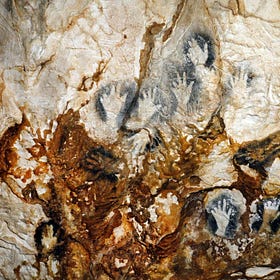November Subscriber Post
Finger removal, the Bayesian Conspiracy, and Vikings in Mexico
Previously on Vectors of Mind
It’s been a busy couple of months. You guys are getting your money’s worth! (It’s free; there are no perks to paying.)
Pygmy Eve Peeps God
Anthropologist Paul Schebesta’s 1936 work, Revisiting My Pygmy Hosts, offers a window into the creation myths and belief systems of the Efe pygmies of the Congo. Their explanation of the original sin bears striking similarities to Genesis and offers intriguing insights when viewed throu…
Overview of articles to date
Vectors of Mind has been around for two years now, and there’s quite a bit of content that builds on itself. Enjoy this 90 minute monologue where I describe each article chronologically, and give some meta-level commentary.
NotebookLM on the Eve Theory of Consciousness
Using Google’s NotebookLM has been a game-changer for searching through mid-sized text databases. In my recent research on creation myths similar to Genesis, I uploaded the thirteen-part anthology The Mythology of All Races. NotebookLM’s ability to search for concepts like creation myths, snake myths, and primordial matriarchies goes beyond simple keywo…
The Love Symposium
Data scientist Matthew Fisher and I met at the Less Online conference at Lighthaven in Berkeley, where I gave a presentation on the Snake Cult of Consciousness. Between sessions, we discovered we had both been deep in the literature at the intersection of machine learning and personality psychology. In fact, he brought up some of my PhD research before …
The Origins of Human Consciousness with Dr. Tom Froese
Dr. Tom Froese is a researcher in enactive artificial intelligence investigating the systematic organization of life and mind. He received his PhD in cognitive science from the Un…
Other Podcasts
I also got the chance to talk to Eneasz Brodski and Steven Zuber IRL while I was in SF for the Love Symposium. I have the mic from the 15-30 minute mark. (And a full episode on the Snake Cult and losing religion will come later.)
DeepLeftAnalysis interviews me on the Snake Cult:
Links
New paper finds evidence for selection against schizophrenia in the last 10,000 years: Leveraging ancient DNA to uncover signals of natural selection in Europe lost due to admixture or drift. Not to be confused with the Reich lab paper that found the same.
How the Stab of Conscience Made Us Really Conscious. This is an interesting paper on how regret could have been pivotal in the evolution of human consciousness. Not so far from my arguments about super-ego begetting the ego.
“Human culture is uniquely open-ended rather than uniquely cumulative” Another take on the human special sauce. However, if that is what makes us human, when is the open-endedness present? And what cognitive mechanism does it rely on? My bet would be recursion starting ~50 kya. And rituals that taught “I,” a particular type of recursion, spreading worldwide 15 kya.
From the New York Times: Nature’s ‘Swiss Army Knife’: What Can We Learn From Venom?
A study of Gila monster venom helped start the revolution in weight-loss drugs. But scientists think that’s just the beginning.
Cf this 2018 paper which claims, “Therefore, snake venom AChE is the best source of drug design for the treatment of Alzheimer's disease.” Or, on the flip side, this review finds depression, delusion, and PTSD to be common after a snake bite. Remember, their venom is a neurotoxin.
Big Think has an article defending the Stoned Ape Hypothesis. But note the timeline:
“Between about 100,000 and 40,000 years ago, there was a period of rapid cognitive development in human evolution known as the “cognitive revolution,” or “Great Leap Forward.”…It would not be an overstatement to say that this evolutionary transition represents the “birth of humanity.””
But there’s almost no evidence of psychedelic shamanism—or shamanism writ large—before 50 kya. The magic of the Stoned Ape Hypothesis is that we could have evolved by gene-culture interaction, which can explain why sapience is younger than Homo Sapiens’ genetic splits. Divergent groups shared in a cultural technology that uplifted the species. At that point, why say the process was complete 40 kya? At any rate, the author has an interesting substack that focuses on “what to do about it.” The most popular essay begins:
“This 6000-word essay presents a foundation for a universal religion by mapping spiritual concepts from Eastern and Western religious philosophy onto the narrative of a self-organizing cosmos. Your feedback and ideas will be used to further shape and optimize the Meta-Religion. Become a paid subscriber to unlock the full article and support the Road to Omega project.”
Wild Wild Country is one of my favorite documentaries—the only TV show I have rewatched twice. And yet Osho’s cult is much darker than what the series let on. My guess is because documentaries do best when they straddle a line that Makes You Think. Maybe Osho had a point? What was the perspective of his followers? Harder to flirt with sympathy if the documentary lays out the child sexual exploitation.
An excellent article from a panpsychist meditator on the Fall:
Finger Amputation in the Ethnographic and Archaeological Record, something I discuss briefly in the episode with Tom Froese.
Large Language Models based on historical text could offer informative tools for behavioral science.
Vikings in America by Aeon Magazine. The Vikings may have interacted with Mayans.
Dr Paulette Steeves maintains a map of dozens of pre-Clovis archeological sites. She is an anthropologist of Native American descent with a strong view that humans have been in the Americas for much longer than has been traditionally accepted.
It’s tempting to read this as the Clovis First model finally falling. But this project is very similar to what Joseph Campbell presented in 1983 in his Historical Atlas of World Mythology. There has always been debate on when the Americas were settled. What made Clovis First attractive is that a new technological complex rapidly spread in both North and South America around 13,000 years ago. If there were humans here before, what happened to them? Why were their technologies so simple? It’s the Sapient Paradox in full force.
As always, use the comments here as a discussion for all thing Vectors of Mind. Anybody you’d like me to interview? What podcasts should I go on?

















Thanks for the link to Left Brain Mystic. That was an excellent write up and I'm now following.